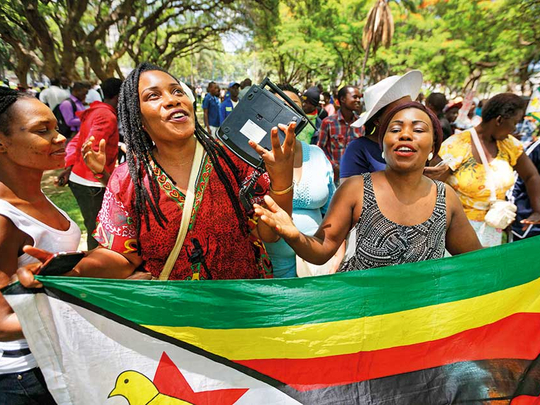
Harare, Zimbabwe: In his first statement since the military took over the country last week, Zimbabwe’s influential former vice president called for his ex-boss President Robert Mugabe’s resignation, urging the beleaguered leader to heed the “clarion call” of his people.
Emmerson Mnangagwa, who is widely seen as Mugabe’s likely successor, said he would remain in exile for the immediate future, while pushing for Mugabe’s dismissal, either through resignation or impeachment proceedings.
That plan appeared to contradict a statement Monday from Zimbabwe’s military, which opened the door to the possibility that 93-year-old Mugabe could stay in power, and Mnangagwa, himself, would soon return.
- Lovemore Madhuku | Law professor
The future of Zimbabwe’s government has shifted almost every day over the past week, as alliances have been reshaped and plans to oust Mugabe have morphed from a military takeover to a dismissal led by the country’s lawmakers.
Now a fissure appears to have emerged between the country’s military and Mnangagwa, an alliance that until days ago appeared at the core of the plan to replace Mugabe.
Gen. Constantino Chiwenga, chief of Zimbabwe’s armed forces, said the military had held “further consultations with the president to agree on a road map” for the country, Mnangagwa’s statement diverged quite a bit from such a diplomatic approach.
He said the people of Zimbabwe had already expressed their “insatiable desire” for Mugabe to resign and backed parliament’s plan to impeach the president if Mugabe declined to step down.
On Tuesday morning, hours after it was released, Mnangagwa’s statement had already echoed across the broad coalition of groups hoping to unseat Mugabe. People arrived at Mugabe’s residence and in front of parliament to demand his ejection.
“We will continue to fight until comrade Mugabe is out of power,” said Douglas Mahiya, a spokesperson for the influential National Liberation War Veterans Association.
Although Mugabe’s fate remained murky, the fact that so far he had survived a military takeover, historic opposition protests and removal from his own political party suggested once again his uncanny ability to hang on to power. In the statement Monday night, the military referred to Mugabe as the commander in chief and said the military was “encouraged by new developments.”
Mnangagwa’s dismissal triggered the military intervention last Tuesday, and thousands took to the streets to celebrate what appeared to be the end of Mugabe’s rule. But on Sunday night, in what many expected to be a publicly televised resignation, the world’s oldest head of state instead delivered a meandering speech in which he made it clear that he had no intention of leaving the presidency.
Analysts said military commanders may have worked out a deal that would lead to Mugabe’s resignation after an interim period and his replacement by Mnangagwa, possibly during next month’s congress of the ruling ZANU-PF party. For now, the military’s vague statement about a “road map” left plenty of room for conjecture.
What was clear was that as long as Mugabe remains in power, millions here will be devastated. For years, as Mugabe’s rule grew more erratic and repressive — and as the economy collapsed — Zimbabweans spoke openly about when and how the “old man” would go. The past week seemed to bring that outcome closer than ever.
Mnangagwa’s return would appease a small but powerful segment of the ruling party. He has been a core member of ZANU-PF for decades and has strong connections to the security forces. But many Zimbabweans see him as corrupt and oppressive for having helped insulate Mugabe’s regime for years before his abrupt falling-out with the president.
Mugabe could still be forced out through constitutional channels. Lawmakers were expected to begin proceedings Tuesday to impeach him, but it was unclear how the military’s statement would affect those plans. Some members of parliament who support Mnangagwa could now back away from impeachment.
Both military and civilian opponents of Mugabe appear eager to imbue any successor with an air of legitimacy that would be accepted by the international community. In its bylaws, a regional bloc of southern African nations includes strong language against coups.
“For years we’ve been victims of the lawlessness of the ruling party,” said Lovemore Madhuku, a professor of constitutional law at the University of Zimbabwe. “If we abandon the law to get Mugabe out, we are not safeguarding ourselves from more lawlessness in the future.”
Mugabe has taken the law into his own hands for much of his rule, encouraging his government to seize land belonging to white farmers by force and ordering the detention of political opponents. This month, a 25-year-old American woman, Martha O’Donovan, was arrested for subversion after she allegedly insulted Mugabe on Twitter. Two weeks ago, four people were detained for booing the president’s wife at a rally.
But when Mugabe’s own government finally turned against him, it declined to use the same brute force or extrajudicial power he has employed for years.
Aside from wanting to avoid allegations of coup-plotting, Zimbabwe’s military may have been showing deference to the only president Zimbabwe has ever had and a hero of the country’s liberation struggle.
Amid the uncertainty, a debate is raging among legal experts and lawmakers about how long an impeachment process would take. Paul Mangwana, deputy secretary of ZANU-PF, said it would take only two days. Madhuku said it would likely take months if the law were followed.












